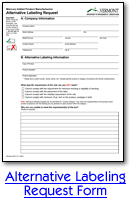 |
| MERC home > Manufacturer Requirements > requirements under 1998 law > alternative Labeling |
Alternative Labeling
(c) The Secretary may administratively authorize alternative labeling, including package labeling, for mercury-added consumer products listed in Subsection 6-803(a)(2) above under the following conditions: (1) A manufacturer must submit a written request for alternative labeling documenting that a product or class of products cannot reasonably be labeled to comply with specific requirements of Subsections 6-803(a) and/or (b) above. (2) All authorizations for alternative labeling granted under this Subsection will be limited in duration and may be renewed. Alternative labeling requests are ONLY necessary when a manufacturer:
Alternative Labeling Request forms are available here. Product-specific Labeling AlternativesThe Agency has developed the following Labeling Alternatives for a few product categories that can be used by manufacturers of those products, if applicable, without having to complete an Alternative Labeling Request.
Note: All alternatives have a specific duration and can be renewed- see alternative renewal guidance. Note: If you manufacture a product that falls within one of these product categories and you wish to utilize one of these guidelines in developing your plan, please indicate the guideline number on the certified labeling plan form. When should a manufacturer submit an alternative labeling request?A manufacturer should submit an alternative labeling request when they cannot label their product or package using guidance for standard labeling because the manufacturer:
Who reviews an alternative labeling request?Vermont is the only state thus far that receives and reviews manufacturers' proposed labeling prior to implementation to determine compliance with requirements. Other states in the Northeast also have labeling requirements for mercury-added products but do not require the submission of a plan for labeling. These same states do, however, provide for review and approval of alternative labeling requests in their labeling laws in order to offer consistency across the region. However, only Vermont reviews and approves alternative labeling requests for lamps and electronics. Vermont participates in this regional multi-state review to provide consistency for any new alternative requests for products (other than lamps and electronic products) and renewals of existing alternatives. Alternative requests are reviewed though a multi-state review process
through the Interstate
Mercury Education and Reduction Clearinghouse (IMERC) Upon approval, Vermont DEC will issue an alternative number, which the manufacturer should use when completing the Certified Labeling Plan. What does a manufacturer need to know before submitting an alternative labeling request?If a product or package label cannot meet standard labeling requirements or pre-established alternatives or guidelines as provided in the Standard Labeling Guidance for one of the reasons listed above, a manufacturer should complete an Alternative Labeling Request form. The alternative request form can be completed on line and submitted electronically. The alternative labeling request form should identify in detail the specific standard labeling requirements that cannot be met under the law. The second part of the form is the proposal for an alternative labeling method. The proposal should contain all proposed labeling methods for the specific product - including product, package, sales literature or any other methods, which are proposed to use. In this way, all proposed labeling methods are evaluated as a complete labeling request. Alternatives can be submitted for an individual product, (which may also include alternative labeling for products as well as packages combined), or categories of products provided that:
Once an alternative labeling method is approved and a number is assigned, what is the duration of the approval?All alternatives have a two-year duration with opportunity for renewal (except for the automobile alternative #ALT-0216, which has a three-year duration). The anniversary date of each alternative is March 1st - an alternative request approved mid-term will likely be renewed at the next renewal term or may receive additional time if the renewal date is within a few months. The duration and renewal date of a manufacturer's alternative will be provided when the alternative number is assigned. Alternative Renewal GuidanceAll individual alternatives renew on an even year every two years
(March 1, 2004, 2006, 2008 etc.)
Requests for renewal of alternatives (excluding renewals of
alternatives for lamps and electronics which should be submitted
to Vermont) should be submitted six months prior to the renewal
anniversary date to IMERC, 129 Portland Street, 6th Floor, Boston,
MA 02114. To request renewal of an approved alternative labeling method, submit a request for renewal for an additional term in writing to IMERC indicating the alternative number assigned to your approval by Vermont. A multi-state review of alternative renewals will be conducted
through IMERC
|
|
|
||||||||
|
MERC Home | mercury-added
product manufacturer requirements | labeling
requirements under 1998 law | labeling
requirements under 2005 law Mercury Education & Reduction Campaign |


